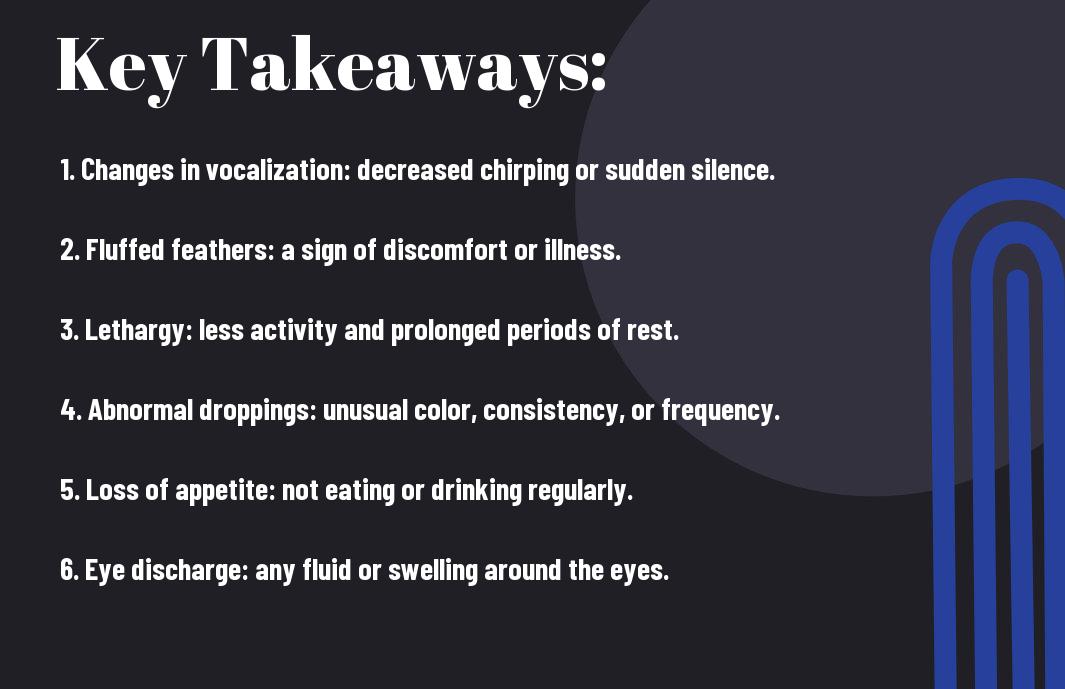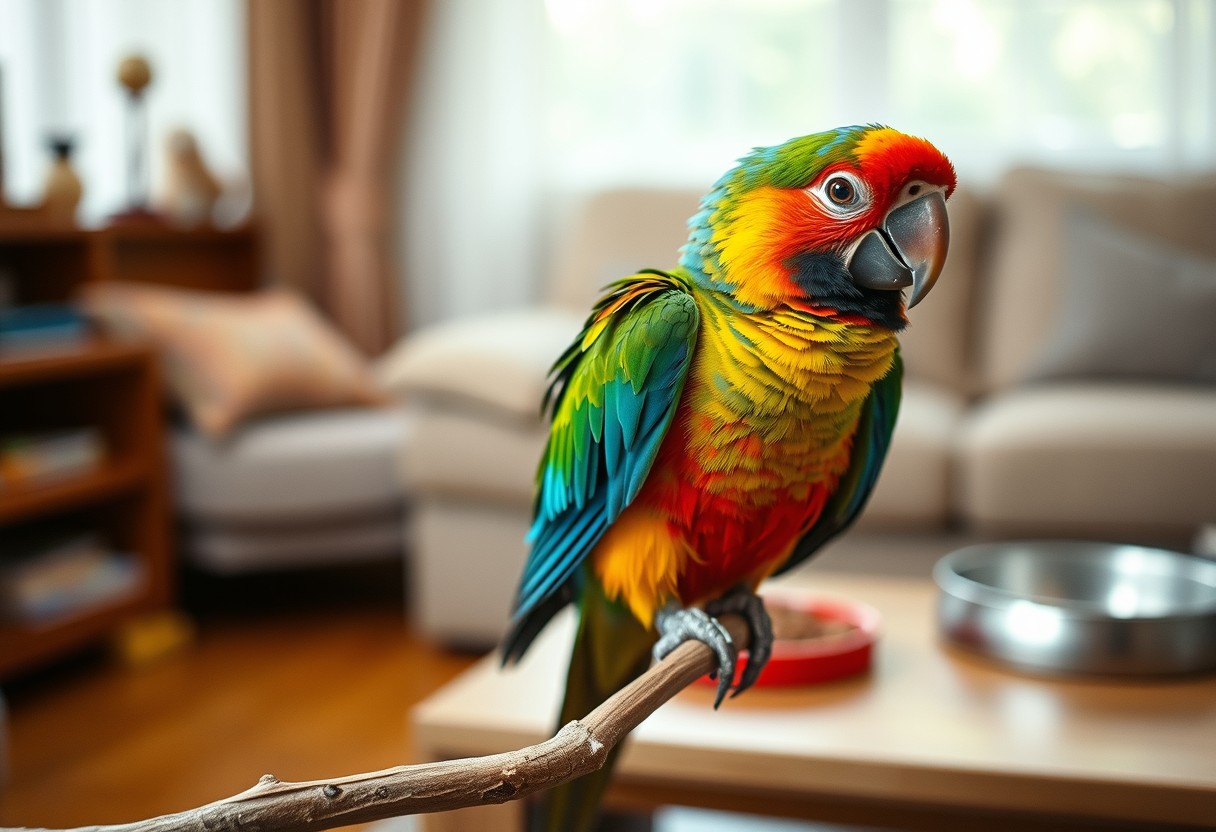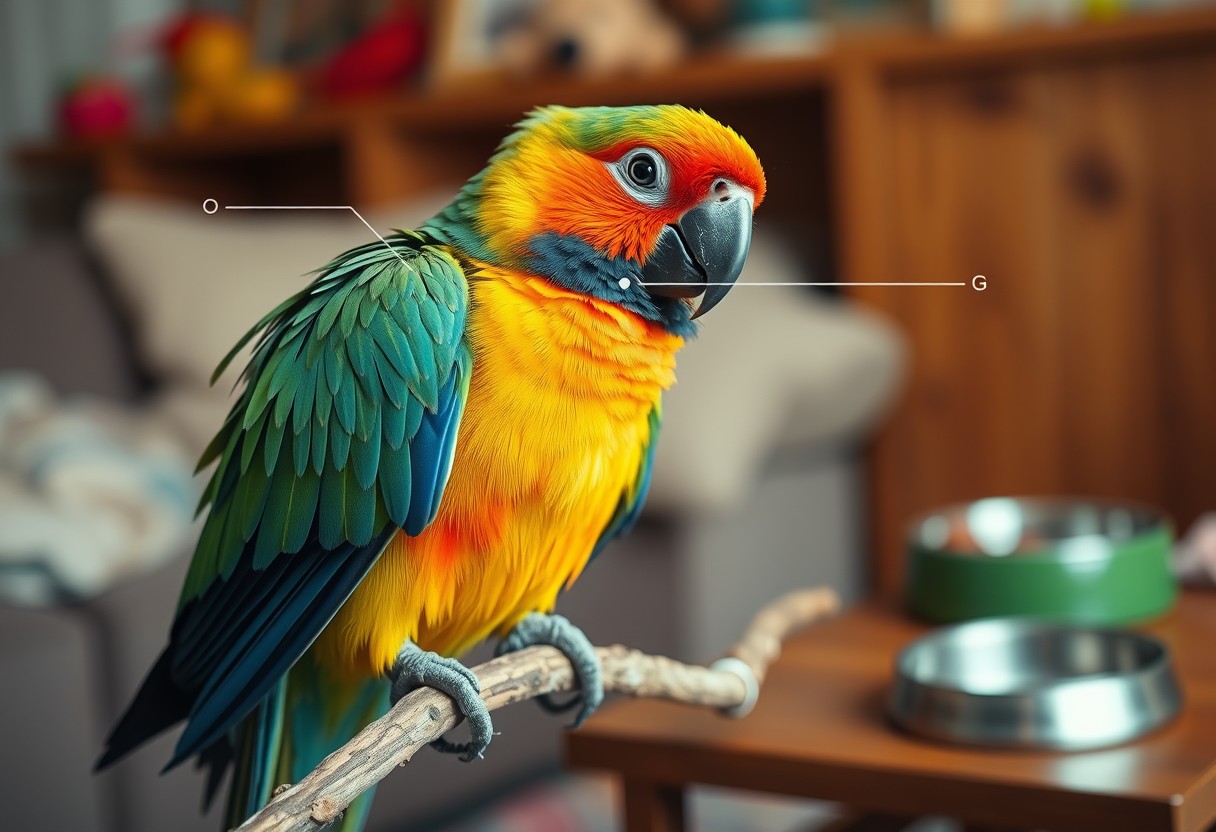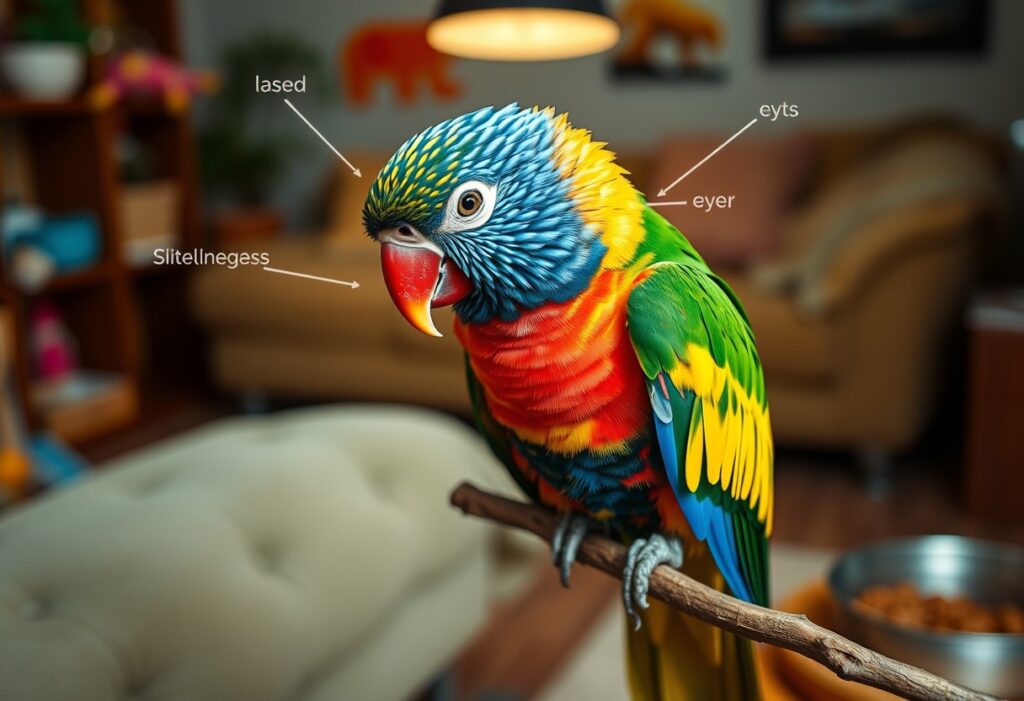Birds are often seen as vibrant companions, but changes in behavior or appearance can signal serious health issues. As a responsible bird owner, it’s crucial for you to recognize the early signs of illness to ensure your feathered friend receives the appropriate care. In this post, we will discuss the most common symptoms to watch for, helping you keep your bird healthy and thriving. Being vigilant could make all the difference in your pet’s wellbeing, so let’s explore what to look out for!

Common Symptoms of Sickness in Birds
To recognize when your bird may be unwell, it’s necessary to familiarize yourself with the common symptoms of sickness. Being vigilant about these signs can help you act quickly, ensuring your feathered friend receives the care it needs. Here are some critical changes you should monitor closely.
Changes in Behavior
Common behavior changes you might notice include increased lethargy, hiding or isolating itself, and a lack of interest in socializing and playing. If your usually playful parrot suddenly becomes quiet and withdrawn, this could be an indication of an underlying health issue. Additionally, watch for any signs of aggression or irritability which may also signal distress or discomfort.
Also, keep an eye out for any changes in preening habits. A bird that usually spends time grooming may stop altogether, which can signify that something is wrong. Be attentive to your bird’s body language, as subtle shifts can often be the first signs that something is amiss.
Alterations in Eating Habits
To notice whether your bird is unwell, pay close attention to any alterations in its eating habits. A typical sign of illness may include reduced food intake, which can manifest as fewer seeds consumed or a lack of interest in fresh fruits and vegetables. Conversely, some birds might overeat in response to stress or discomfort, leading to potential obesity or digestive issues.
This inconsistency in their diet can quickly lead to nutritional deficiencies and make matters worse. If your bird refuses to eat anything at all or shows sudden weight loss, it’s crucial to consult an avian veterinarian immediately to determine the cause and appropriate treatment.
Physical Changes in Appearance
One clear sign that your bird may be sick is any noticeable physical changes in appearance. Symptoms like fluffed-up feathers, drooping wings, or an unkempt appearance can indicate that your pet is feeling poorly. You may also notice discharge from the eyes or nostrils, changes in the color or texture of the feathers, or swelling around the face and feet.
Plus, it’s important to be aware of symptoms like unexplained weight loss or bloating that may suggest internal issues. Noticing these physical changes early can significantly increase the chances of a successful recovery for your bird.
Abnormal Vocalizations
The vocalizations of your bird can be a window into its health. If your usually chatty bird suddenly becomes silent or vocalizes differently, it may indicate distress or illness. Listen for any unusual sounds like coughing, wheezing, or changes in the pitch or tone of your bird’s calls, as these might signal respiratory problems or pain.
Appearance of odd vocalizations is a serious concern and should not be overlooked. Such changes may be the precursor to more severe health issues, emphasizing the importance of contacting a veterinarian if you notice anything out of the ordinary.

Specific Signs by Species
Assuming you are a bird owner, it’s crucial to recognize that different species exhibit specific signs when they are unwell. By understanding these unique indicators, you can better care for your feathered friend. In this section, we will explore signs of illness in parrots, canaries, and finches, helping you to identify potential health concerns before they escalate.
Signs in Parrots
Species such as parrots are known for their vibrant personalities, and when they show behavioral changes, it often indicates a potential problem. If your parrot becomes less vocal or starts to isolate itself from family interactions, it may be a sign of distress or illness. Look for additional signs such as changes in appetite, lethargy, or abnormal droppings. In particular, persistent regurgitation or a swollen abdomen could indicate serious health issues that require immediate veterinary attention.
Moreover, if you notice abnormal feather loss or discoloration, this can signal a range of potential health problems, from nutritional deficiencies to parasitic infections. Quickly observing and addressing these changes can lead to effective treatment and a better outcome for your parrot.
Signs in Canaries
To understand the health concerns in canaries, pay attention to their singing habits. Canaries are known for their melodious songs, and a sudden decrease in vocal activity can indicate illness. Additionally, monitor your canary for any changes in its feeding behavior. If you notice a reluctance to eat or any signs of weight loss, it might be time for a closer examination of your pet’s health.
A canary that appears to be fluffed up, lethargic, or has difficulty breathing may be suffering from respiratory issues or other ailments. Check your canary’s droppings, as changes in consistency or color can also signal illness. It’s vital to consult with an avian veterinarian promptly to address any concerning symptoms.
Signs in Finches
Specific signs in finches may range from subtle changes to more noticeable issues. If your finch becomes less active or more withdrawn, it could indicate stress or an underlying health problem. Monitoring their droppings for abnormalities can also be very informative; any significant change could be a warning signal about their well-being. A finch that is not preening itself properly may also exhibit signs of illness, as grooming is an crucial behavior for maintaining health.
With finches, be particularly alert for any signs of *heavy breathing or flaky skin*, which could suggest respiratory infections or skin conditions. By keeping a close eye on your finch’s habits, you can identify issues early and seek veterinary assistance when necessary.

Environmental Factors Affecting Bird Health
Once again, understanding the environment in which your bird lives is crucial for its overall health and well-being. Various environmental factors can directly impact your bird’s health, and it is important to be vigilant about these elements. Here are some key areas you should monitor:
- Cleanliness
- Temperature
- Stress Factors
Importance of Cleanliness
With proper cleanliness, you can significantly reduce the risk of disease and promote a healthier environment for your bird. Regularly cleaning your bird’s cage and surrounding areas helps minimize the buildup of bacteria and harmful pathogens. It’s imperative to ensure that food and water containers are kept clean, as contaminated food and water can lead to various health issues.
Additionally, a clean environment can reduce allergens and irritants. You should also pay attention to the substrate used in the cage, as certain materials can harbor dust and mold. Regular cleaning routines can create a positive, healthy living space, which directly influences your bird’s well-being.
Impact of Temperature Changes
To maintain your bird’s health, be aware of how temperature changes can affect them. Birds are particularly sensitive to fluctuations in temperature, which can lead to stress or illness. Ensuring a stable and appropriate temperature range is critical. Generally, a comfortable temperature for most birds hovers around 65°F to 75°F (18°C to 24°C).
Temperature Guidelines for Birds
| Too Cold | Hypothermia, lethargy, and potential death |
| Too Hot | Heat stress, difficulty breathing, and even heat stroke |
Environmental temperature extremes can hinder your bird’s ability to regulate its body temperature, leading to severe health implications. Being mindful of your bird’s environment and making the necessary adjustments in temperature during seasonal changes are important for their overall health.
Additional Temperature Considerations
| Drafts | Can cause chills or illness |
| Humidity Levels | Extreme humidity can lead to respiratory issues |
Stress Factors in Cage Life
Affecting your bird’s happiness and health, various stress factors in its cage life can lead to various behavioral issues or chronic health problems. You should observe for signs of stress such as excessive vocalization, feather plucking, or anxiety when you’re around. Factors that contribute to stress within a bird’s environment include overcrowding, lack of stimulation, and inconsistent routines.
- Overcrowding
- Lack of stimulation
- Inconsistent routines
The adjustment to these stress factors will allow your bird to enjoy a healthier, happier life. Providing appropriate enrichment activities and a spacious environment will greatly decrease stress levels, thus promoting overall health.
Factors like the type of cage you choose, the number of companions in the same space, and the general conditions around the cage can significantly determine how your bird perceives its environment. The understanding and management of these factors are vital in ensuring a low-stress habitat.
- Spacious cage design
- Quality toys
- Consistent interaction
The adjustments you make in your bird’s living area will directly impact its mental and physical health. Investing time in creating a stress-free environment is important for your feathered friend’s longevity and happiness.
Summing up
Taking this into account, being observant of your bird’s behavior and health is crucial for its overall well-being. As a responsible pet owner, it’s important to recognize the signs that may indicate your feathered friend is unwell. Changes in appetite, lethargy, unusual vocalizations, or alterations in droppings can all be red flags that should not be overlooked. By familiarizing yourself with these symptoms, you increase the chances of providing timely intervention, which can make all the difference in your bird’s recovery.
Furthermore, understanding the significance of regular veterinary check-ups is imperative in supporting your pet’s health. Routine examinations can help catch potential health issues early on, even before noticeable symptoms arise. If you ever notice any unusual signs or behaviors in your bird, don’t hesitate to consult with an avian vet. Be mindful of, your vigilance and proactive approach can lead to a longer, healthier, and happier life for your beloved bird.
FAQ
Q: What are some common signs that my bird might be sick?
A: There are several signs to watch out for that could indicate illness in your bird. These include changes in appetite (eating less or not at all), lethargy (seeming unusually tired or inactive), feather plucking or ruffled feathers, changes in vocalization (sudden silence or different sounds), abnormal droppings (changes in color, consistency, or frequency), difficulty breathing (wheezing or open-mouth breathing), and any signs of distress or pain (such as fluffed feathers or avoidance of handling). If you notice any of these signs, it’s important to consult a veterinarian as soon as possible.
Q: How can I tell if my bird is experiencing respiratory problems?
A: Respiratory issues in birds can manifest in several specific ways. Watch for symptoms like labored or open-mouth breathing, wheezing or coughing sounds, nasal discharge, and tail bobbing (a sign of difficulty breathing). Additionally, birds may appear more fluffed up than usual and may become less interactive. If you notice any of these signs, it is crucial to seek veterinary care immediately, as respiratory distress can escalate quickly in birds.
Q: When should I take my bird to the vet if I suspect it is sick?
A: You should take your bird to the vet at the first sign of any unusual behavior or symptoms. It’s particularly important to seek veterinary attention if you notice a sudden change in appetite, behavior, or if your bird exhibits obvious distress, such as difficulty breathing, inability to perch, or abnormal droppings. Remember that birds often hide their illness very well, so if you suspect something is off, it’s better to err on the side of caution and schedule an appointment with an avian veterinarian. Prompt treatment can be vital in improving your bird’s health outcomes.










